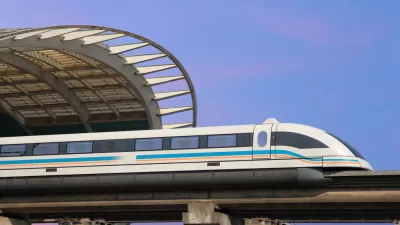Maglev high-speed rail, financed (partially) by Japan, is still under consideration for the stretch between Washington, D.C. and Baltimore. It would take a princely sum to build.

With the potential to rival airliners for speed, maglev trains are something of a pipe dream in this country. Joe Fox writes, "Superconducting maglev trains ('SCMAGLEV,' to be even more precise) are a rail technology that eschews rails, instead sitting within a concrete guideway. Trains are surrounded by superconducting magnets on each side, causing them to 'float' in the guideway."
Despite a lack of American high-speed rail savvy, backers near the nation's capital are eyeing the concept. "The Baltimore-Washington Rapid Rail (BWRR) organization held a series of open houses across the region in December to showcase the work that they have done so far, and solicit general public comment on their Environmental Impact Statement (EIS)."
The prospect of a 15-minute ride from D.C. to Baltimore is compelling, and the plan envisions an extension to New York City. But who puts up the money? "The Japan Bank of International Cooperation (JBIC) has offered to pay half the cost of the D.C.-to-Baltimore line. The remainder of the initial funding would come from a yet-to-be-identified mix of (American) federal, state, and private sources."
FULL STORY: The idea for a maglev train from DC to Baltimore keeps…floating down the track

Planetizen Federal Action Tracker
A weekly monitor of how Trump’s orders and actions are impacting planners and planning in America.

Map: Where Senate Republicans Want to Sell Your Public Lands
For public land advocates, the Senate Republicans’ proposal to sell millions of acres of public land in the West is “the biggest fight of their careers.”

Restaurant Patios Were a Pandemic Win — Why Were They so Hard to Keep?
Social distancing requirements and changes in travel patterns prompted cities to pilot new uses for street and sidewalk space. Then it got complicated.

Platform Pilsner: Vancouver Transit Agency Releases... a Beer?
TransLink will receive a portion of every sale of the four-pack.

Toronto Weighs Cheaper Transit, Parking Hikes for Major Events
Special event rates would take effect during large festivals, sports games and concerts to ‘discourage driving, manage congestion and free up space for transit.”

Berlin to Consider Car-Free Zone Larger Than Manhattan
The area bound by the 22-mile Ringbahn would still allow 12 uses of a private automobile per year per person, and several other exemptions.
Urban Design for Planners 1: Software Tools
This six-course series explores essential urban design concepts using open source software and equips planners with the tools they need to participate fully in the urban design process.
Planning for Universal Design
Learn the tools for implementing Universal Design in planning regulations.
Heyer Gruel & Associates PA
JM Goldson LLC
Custer County Colorado
City of Camden Redevelopment Agency
City of Astoria
Transportation Research & Education Center (TREC) at Portland State University
Camden Redevelopment Agency
City of Claremont
Municipality of Princeton (NJ)




























